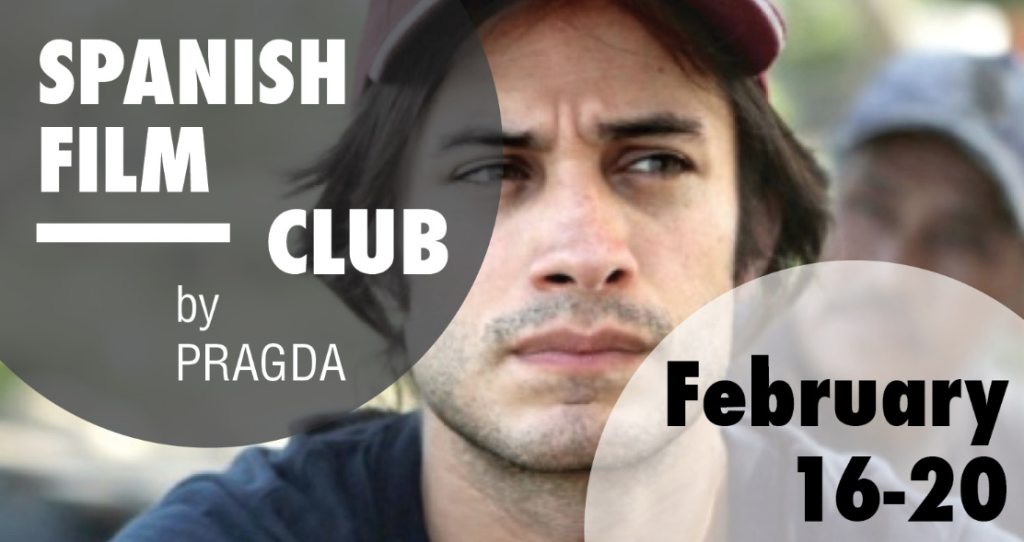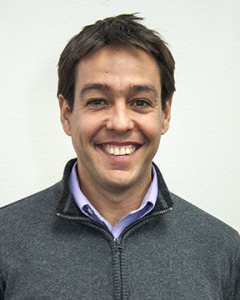
The screening of five modern, Latin American films at UW-L will shine a spotlight on the political, social and cultural issues faced in another part of the world.
UW-L’s second annual Spanish film festival runs Monday-Friday, Feb. 16-20. All films will show at 5 p.m. in Graff Main Hall Auditorium. Admission is free.
“There is very little distribution of contemporary Spanish and Latin American cinema throughout universities,” says Assistant Professor of Spanish Omar Granados. “One of our goals is to provide professors and students from every department access to materials rarely seen within North America.”
[caption id="attachment_38798" align="alignright" width="240"]

Omar Granados[/caption]
Although the films are set in Latin American countries, they touch on issues that can be easily related to U.S society, and to the economic and political relation that the U.S has with these countries, says Granados. Common themes include social justice and inequality, expressed through class, gender, race and more.
The film series generates a cultural exchange that is key in a country where Hispanics and Latinos are the largest minority, adds Granados.
“Some of our students don’t have the resources to travel, but they want to learn about the many cultures addressed in class,” says Granados. “Film gives you a realistic perspective on life and images are easier to compare than text.”
All the films are in Spanish with English subtitles and will be followed with a discussion. The movies were all made between 2012-14.
Monday, Feb. 16, Graff Main Hall Auditorium, Free
Who is Dayani Crystal?/Marc Silver/Mexico – USA/85 min/2014
Deep in the sun-blistered Sonora desert beneath a cicada tree, Arizona border police discover a decomposing male body. Lifting a tattered T-shirt they expose a tattoo that reads “Dayani Cristal.” Who is this person? What brought him here? How did he die? And who — or what — is Dayani Cristal? As the forensic investigation unfolds, Mexican actor and activist Gael Garcia Bernal retraces this man’s steps along the migrant trail in Central America. In an effort to understand what it must have felt like to make this final journey, he embeds himself among migrant travelers on their own mission to cross the border. As we travel north, this film gives us a rare insight into the human stories that are so often ignored in the immigration debate. Winner of the Sundance 2013 Cinematography award and nominated in the World Documentary Competition, “Who Is Dayani Cristal? “ shows how one life becomes testimony to the tragic results of the U.S. war on immigration.
Presentation and discussion by Nicholas Villanueva (Dept. of Ethnic and Racial Studies).
View Campus Calendar listing of the event.
Tuesday, Feb. 17, Graff Main Hall Auditorium, Free
Pelo Malo (Bad Hair)/Mariana Rondón/Venezuela/93 min/2013
A 9-year-old boy’s preening obsession with straightening his hair elicits a tidal wave of homophobic panic in his hard-working mother, in this tender but clear-eyed coming-of-age tale. Junior is a beautiful boy with big brown eyes, a delicate frame and a head of luxurious dark curls. But Junior aches to straighten those curls, to acquire a whole new look befitting his emerging fantasy image of himself as a long-haired singer. Junior’s father has died, and his mother now struggles to put a few arepas on the table for Junior and his baby brother. Junior doesn’t even know yet what it means to be gay, but the very notion prompts Marta to set out to “correct” Junior’s condition before it fully takes hold. This is a story of people doing what they feel they have to, partly out of fear, but also out of love. Winner of the top award at the San Sebastian Film Festival in 2013, “Bad Hair” is the intimate story of a nine-year old child’s initiation to life and his difficult journey marked by intolerance.
Presentation and discussion by Richard Breaux (Department of Ethnic and Racial Studies).
View Campus Calendar listing of the event.
Wednesday, Feb. 18, Graff Main Hall Auditorium, Free
El facilitador (The Facilitator) Víctor Arregui/Ecuador/83 min/2014
A political thriller about human rights, “The Facilitator” is one of the most successful films to come out of Ecuador in the last few years. Elena reconnects with her childhood friend Galo, who now promotes water access rights for the indigenous community. She is compelled by their way of life and gets involved with the political organization of the community. Elena will gradually understand that among her own family secrets, crimes, corruption, and dark perversions, commitment and beauty can emerge.
Presentation and discussion by Adam Driscoll (Department of Sociology and Archaeology)
View Campus Calendar listing of the event.
Thursday, Feb. 19, Graff Main Hall Auditorium, Free
Infancia clandestina (Clandestine Childhood)/Benjamin Ávila/Argentina/110 min / 2013
Benjamín Ávila’s Clandestine Childhood is an earnestly heartfelt cine-memoir based on the director/co-writer’s own tragic early life. Argentina, 1979. After years of exile, 12-year-old Juan and his family come back to Argentina under fake identities. Juan’s parents and his uncle Beto are members of the Montoneros Organization, which is fighting against the Military Junta that rules the country. Because of their political activities they are tracked down relentlessly, and the threat of capture, and even death, is constant. However, Juan’s daily life is also full of warmth and humor, and he quickly integrates into his new environment. Juan accepts this and follows all of his parents’ rules until one day he is told that they need to move again immediately, and leave his friends behind without an explanation. This exceptional first feature not only captures the spirit and passion of the freedom fighters who gave their lives for a cause, but also gives voice to their children, caught in a battle that was not their own, yet rising heroically to the challenge. This story about militancy, undercover life, and love is the Argentine submission for the 2013 Best Foreign-Language Academy Award.
Presentation and discussion by Maria Ghiggia (Department of Modern Languages).
View Campus Calendar listing of the event.
Friday, Feb. 20, Graff Main Hall Auditorium, Free
Zona Sur (Southern District)/Bolivia/Juan Carlos Valdivia/109 min/2012
The neighborhood Zona Sur in La Paz is Bolivia’s most exclusive enclave, home to the country’s affluent elite for generations. Here, in an adobe-tile-roofed castle, a statuesque matriarch reigns over her spoiled offspring and indigenous servants. Social change, however unwelcome, is on its way. As the mother squabbles with her self-indulgent, oversexed teenage son and clashes with her petulant daughter, her 6-year-old boy wanders the rooftops unsupervised. The scent of impending decline permeates the air, and the threat of aristocratic privileges quickly changing hands heralds a new era in a seemingly interminable class war. Bolivia’s official entry for the Academy Awards foreign-language film in 2012, this searing portrait of a patrician family in flux eloquently chronicles their final days during a time of intense social change and effectively exposes the bubble of decadence in which they exist.
Presentation and discussion by Julia McReynolds-Perez (Department of Sociology and Archaeology).
View Campus Calendar listing of the event.
The festival is funded through a grant obtained by the UW-L Institute for Latin American Studies with the Pragda Film Institute in New York. The “Spanish Film Club Series” by Pragda is a travelling film festival for U.S. colleges and universities that is partly supported by the Embassy of Spain in Washington D.C., the Spain-USA Foundation and the Secretary of State for Culture of Spain. The UW-L College of Liberal Studies also provided funds.

 The screening of five modern, Latin American films at UW-L will shine a spotlight on the political, social and cultural issues faced in another part of the world.
UW-L’s second annual Spanish film festival runs Monday-Friday, Feb. 16-20. All films will show at 5 p.m. in Graff Main Hall Auditorium. Admission is free.
“There is very little distribution of contemporary Spanish and Latin American cinema throughout universities,” says Assistant Professor of Spanish Omar Granados. “One of our goals is to provide professors and students from every department access to materials rarely seen within North America.”
[caption id="attachment_38798" align="alignright" width="240"]
The screening of five modern, Latin American films at UW-L will shine a spotlight on the political, social and cultural issues faced in another part of the world.
UW-L’s second annual Spanish film festival runs Monday-Friday, Feb. 16-20. All films will show at 5 p.m. in Graff Main Hall Auditorium. Admission is free.
“There is very little distribution of contemporary Spanish and Latin American cinema throughout universities,” says Assistant Professor of Spanish Omar Granados. “One of our goals is to provide professors and students from every department access to materials rarely seen within North America.”
[caption id="attachment_38798" align="alignright" width="240"] Omar Granados[/caption]
Although the films are set in Latin American countries, they touch on issues that can be easily related to U.S society, and to the economic and political relation that the U.S has with these countries, says Granados. Common themes include social justice and inequality, expressed through class, gender, race and more.
The film series generates a cultural exchange that is key in a country where Hispanics and Latinos are the largest minority, adds Granados.
“Some of our students don’t have the resources to travel, but they want to learn about the many cultures addressed in class,” says Granados. “Film gives you a realistic perspective on life and images are easier to compare than text.”
All the films are in Spanish with English subtitles and will be followed with a discussion. The movies were all made between 2012-14.
Omar Granados[/caption]
Although the films are set in Latin American countries, they touch on issues that can be easily related to U.S society, and to the economic and political relation that the U.S has with these countries, says Granados. Common themes include social justice and inequality, expressed through class, gender, race and more.
The film series generates a cultural exchange that is key in a country where Hispanics and Latinos are the largest minority, adds Granados.
“Some of our students don’t have the resources to travel, but they want to learn about the many cultures addressed in class,” says Granados. “Film gives you a realistic perspective on life and images are easier to compare than text.”
All the films are in Spanish with English subtitles and will be followed with a discussion. The movies were all made between 2012-14.
